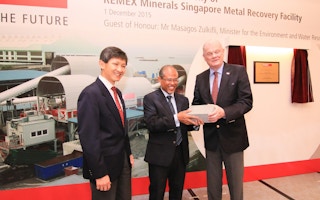Singapore’s newly minted Minister for Environment and Water Resources, Masagos Zulkifli, had described any agreement resulting from the United Nations climate summit in Paris as “much better than not doing anything”, saying it would be a good start to a long-term global effort.
Speaking to reporters in his first comments on the meeting as Environment Minister, Masagos acknowledged criticism by some experts that the pledges made by countries ahead of the talks is “not enough”. But he remained optimistic that some form of a treaty would be forged by negotiators.
Countries have since March submitted their commitments to cut emissions, known as intended nationally determined contributions (INDCs). Currently, the INDCs – commitments from 170 nations to slash emissions – fall short of what is needed, Masagos said on the sidelines of an event on Tuesday.
“All of us have put out some commitments – what we call the INDCs – to limit global temperature rise by about 2 degrees. This is not enough. They are looking at 2 and a half and better,” he said.
The world needs to cap temperature rise at under 2 degrees Celsius, the threshold scientists agree that the world must not cross if it wants to avert dangerous climate change.
He added that the INDCs would be the key to achieving the emissions reduction goal over the longer term and a deal is necessary.
“Right now, we are looking at everyone…making a commitment so that we can together, over the years, achieve this objective,” he said. “I am quite hopeful, but there could still be some tough negotiations in the days ahead.”
More than 40,000 participants are expected at the UN conference from November 30 to December 11, aimed at forging a universal climate change deal.
On Monday, nearly 150 world leaders including US President Barack Obama, Chinese President Xi Jinping and Russian President Vladimir Putin kicked off the conference with a show of solidarity and resolve, agreeing that averting climate change is the most urgent task facing humanity today.
The last time the UN tried to ink a similar global deal was in Copenhagen in 2009, when talks famously broke down and ended in disarray. Developing nations refused to commit to emissions targets and rich countries were accused of not pulling their weight.
Over the succeeding years, governments took small steps to set the roadmap for a legally binding climate deal to be formally negotiated in 2015. This is scheduled to take effect in 2020.
Singapore, for its part, committed in July to reduce the carbon dioxide it emits per GDP dollar by 36 per cent from 2005 levels by 2030, with the aim of peaking its emissions by that time. This has been criticised as not ambitious enough by some experts.
Masagos said on Tuesday that Singapore’s goal is “very aggressive, very ambitious” and the entire government and economy will need to contribute, Masagos said. Every Singaporean will also have to play his part by reducing energy usage as well as recycling and reusing what he can, he added.
The government may also need to regulate industries to make sure that they do not emit more than they are supposed to, he said.
Touching on the recent haze pollution that struck the region as a result of raging forest fires in Indonesia, Masagos also said that regional cooperation in Southeast Asia on this issue, would be an important step towards achieving the global goal.
The impact of climate change – and deforestation – dominated the attention of Singaporeans during the recent Southeast Asia haze, which was caused by burning of peatland in Indonesia for palm oil and timber plantations.
The haze disaster, which lasted almost three months, released one gigatonne of carbon dioxide into the atmosphere, a number that Masagos said is “frightening.”
“If you look at that amount of emissions, it is almost 20 per cent of the reduction we are trying to commit in 2030 globally,” he said. “So, if the world is trying to reduce its emissions, but we do not do something about this burning of our forests, which also emits a huge amount of carbon dioxide, it’s almost counter-productive.”
The Singapore government is therefore working hard to ensure that Southeast Asia collectively addresses the haze issue, including extending an agreement to help Jambi province in Indonesia. Indonesia is committed to fast-tracking and concluding the Jambi agreement by December, Masagos said.
“We look forward to these milestones so that we can show our committed cooperation between the two countries to bring about better environmental outcomes for both our people,” Masagos said.
He was officially opening the country’s first metal recovery facility that can reduce the weight of incineration bottom ash, a by-product of the waste treatment process which ends up at Semakau Landfill.
The S$15 million plant, owned and operated by German recycling specilist Remex, can help reduce incineration bottom ash by 10 per cent, helping extend the lifespan of the landfill.
About 38 per cent of the solid waste generated in Singapore is incinerated at four plants, and Semakau will run out of space in 2035 at the current rate of incineration.
Remex refashions the ash into construction materials such as bricks and concrete slabs.
“Working towards becoming a Zero Waste Nation requires a multi-prong and holistic approach in waste management,” Masagos said. “Business and the community have an active role to play in reducing waste and increasing reuse and recycling.”





















